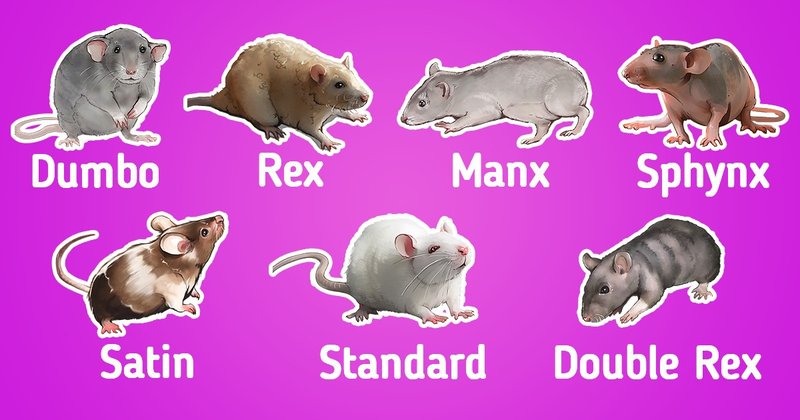
Rex rats, with their distinctive curly fur and playful personalities, offer a special charm. But how do they stack up against other popular pet rat breeds? In this article, we’ll dive deep into the various attributes of Rex rats, compare them to their smooth-coated counterparts, and help you figure out which breed might best suit your home and lifestyle. So, grab a cup of coffee and let’s explore the wonderful world of pet rats together!
What Makes Rex Rats Unique?
Let’s start by highlighting the unique traits of Rex rats. First off, their coat is one of the most noticeable differences. Instead of the typical smooth fur, Rex rats flaunt curly, soft hair that gives them a plush appearance. This fur type is a result of a genetic mutation, and it’s just one of the reasons they stand out in the crowd. If you’re someone who enjoys cuddling with a soft, fuzzy pet, a Rex rat can feel like a warm little cloud in your hands.
In addition to their striking appearance, Rex rats are known for their friendly and social nature. They are typically outgoing and love interacting with their humans. Honestly, if you want a rat that will bond closely with you and is often curious about what you’re doing, a Rex can be a fantastic choice. They enjoy being held, played with, and will readily explore their surroundings—sometimes even helping you with your chores by getting into anything and everything!
For those wondering about care considerations, Rex rats generally require the same environment and care as other rat breeds. They thrive in spacious cages, appreciate plenty of enrichment, and need a balanced diet. However, the curliness of their fur means they might require a bit more grooming since loose fur can become trapped in their curls. So, if you’re up for the extra task of brushing them occasionally, they can become your adorable little pals.
How Do Rex Rats Compare to Standard Rats?
When we talk about standard pet rats, we often mean the smooth-coated varieties. These rats are the classic representation of pet rats that most people think of, and they come with their own set of characteristics. Firstly, their fur is sleek and easy to maintain, which can make them lower-maintenance than Rex rats in terms of grooming.
However, this doesn’t mean standard rats are any less affectionate or social. In fact, here’s the thing: both Rex and standard rats are generally known for their friendly demeanor. But the personalities can differ a bit. Standard rats can be just as adventurous and loving, but they might not be quite as lively as Rex rats, who often have a playful edge.
In terms of health, both breeds are relatively similar. They can suffer from common rat ailments, but genetics can play a role. For instance, Rex rats are a bit more prone to certain skin issues due to their unique fur. If you’re weighing options, it’s important to consider whether you want a low-maintenance pet or if you’re willing to invest a bit more time in grooming.
Rex Rats vs. Dumbo Rats: What’s the Difference?
Dumbo rats have become quite popular due to their distinctive features, particularly their round ears that sit lower on their heads compared to standard rats. They have a very friendly disposition, much like Rex rats. If you’re drawn to the charm of Rex rats but also like the idea of Dumbo rats, you might be torn between the two!
In terms of personality, both Rex and Dumbo rats tend to be social and enjoy human interaction. However, many Dumbo rats exhibit a slightly calmer demeanor, which might make them better suited for families with young children or more laid-back environments. This calmness doesn’t mean they lack playfulness; they just might not be as hyperactive as Rex rats.
Health-wise, both breeds can have similar issues, but Dumbo rats are generally known for being quite hardy. If you’re looking for a breed that is less prone to health issues and still provides a loving companion, Dumbo rats could be the way to go. Ultimately, it comes down to personal preference—do you want the fuzzy curls of a Rex or the adorable low-set ears of a Dumbo?
The Differences in Temperament
When considering Rex rats against other breeds, their temperament is one of the most important factors. Rex rats are known for their playful, often slightly mischievous personality. They love to play, explore, and can sometimes get into trouble if not supervised. If you have an active lifestyle and enjoy a pet that keeps you on your toes, a Rex rat might fit right in.
On the other hand, breeds like the Siamese rat or Himalayan rat tend to be a bit more reserved. While they can be friendly and affectionate, they might not have the same level of energy and curiosity as a Rex. This makes them a great choice for someone looking for a quieter companion.
If you’re deciding on a breed, consider how much interaction and playtime you can provide. Do you want a pet that’s always ready for a new adventure? Or would you prefer a creature that enjoys cuddling on the couch while you watch your favorite show? It’s all about finding the right fit for your home and lifestyle.
Health Considerations for Rex Rats vs. Other Breeds
Every pet comes with its health considerations, and rats are no exception. Rex rats might experience certain skin conditions due to their curly fur, which means extra care when it comes to grooming and checking for any irritations. Other common issues include respiratory problems, which all rats can suffer from, but keeping their living environment clean can help reduce these risks.
In contrast, breeds like the standard rat and Dumbo rat are generally known to be hardy. They might not require as much specialized care, making them appealing to first-time rat owners. However, all rat breeds can suffer from the same health issues, including tumors and respiratory illnesses, so it’s essential to keep an eye on any behavioral changes that could signal a problem.
Regardless of the breed you choose, regular vet check-ups, a nutritious diet, and a clean environment are key to keeping your pet healthy. And keep in mind, every rat is an individual. Getting to know their specific needs is what makes the journey with them so rewarding.
Choosing the Right Breed for You
At the end of the day, choosing between Rex rats and other pet rat breeds really boils down to what you’re looking for in a pet. You might be wondering why it matters: it goes beyond just fur type or ear shape. Think about your lifestyle, time for interaction, and the kind of personality that fits into your daily routine.
If you’re active and love playful antics, Rex rats will surely make you laugh and keep your spirits high. However, if you prefer a pet with a slightly calmer energy, you might want to lean toward Dumbo or standard rats. Both breeds can offer companionship and joy, but it’s about finding the one that enhances your life the most.
So, when you’re ready to welcome a rat into your home, take a moment to reflect on your own preferences, lifestyle, and the level of care you’re willing to provide. It’s not just about the curls or the ears—it’s about finding a friend for life that matches your vibe.
In conclusion, whether you choose a charming Rex rat or another breed, you’re sure to find love and companionship in these small but mighty creatures. Enjoy the journey of exploration, and happy rat-keeping!

